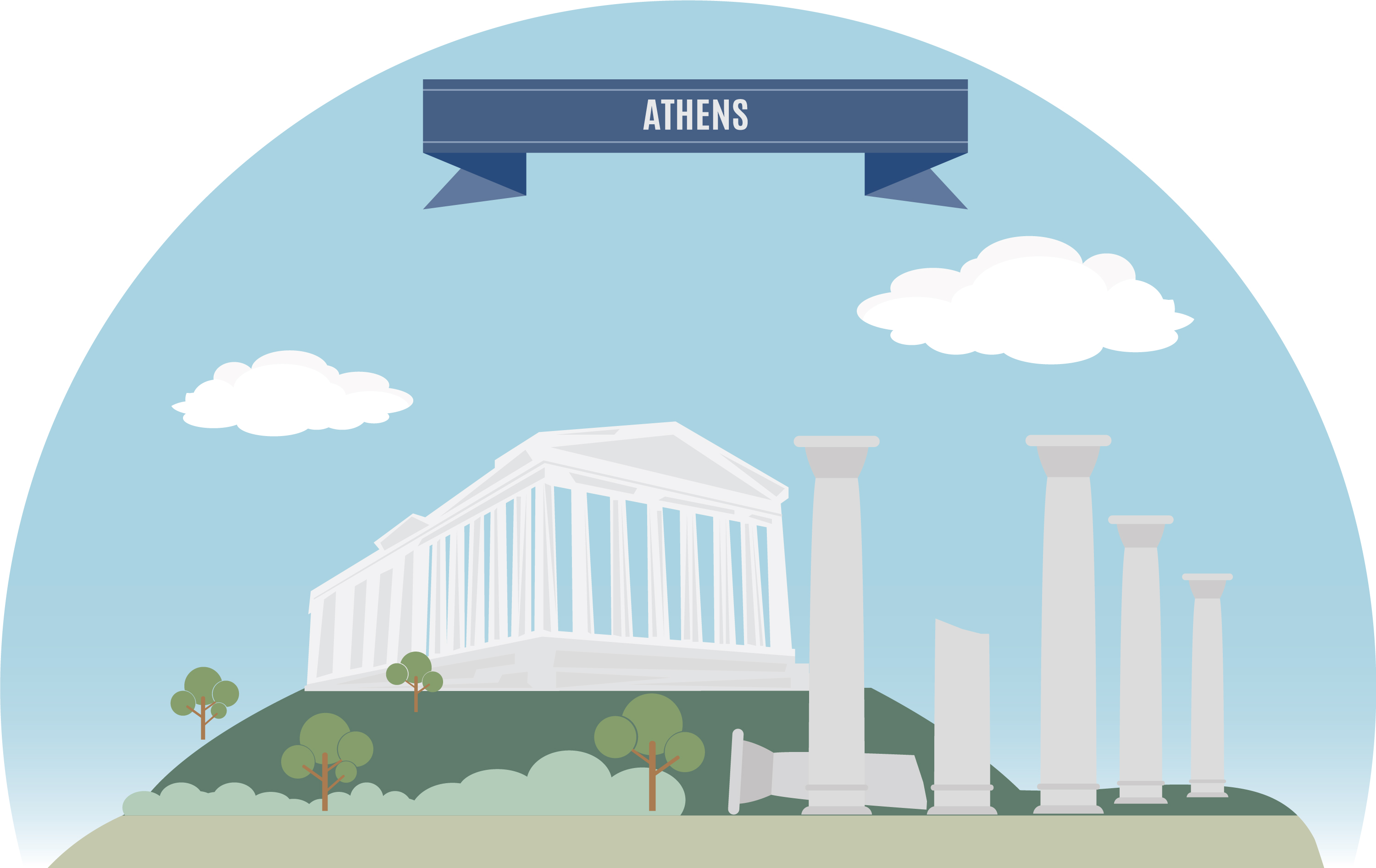Athens - Ἀθῆναι (a.tʰɛ̂ː.nai̯)
Named after her patron Athena Athens is the birth place of democracy and the centre of philosophy. It is a prospering city, one of the largest in the known world. Athens claims to be the birthplace of democracy and philosophy. Though it might be that Athens is just the largest democratic Polis, as there are many other Poleis that consider themselves democratic one way or another.
But not only is she a centre of Greek culture, she is also the heart of the Delian League and thus a military force.
Demographics
Athens is a large city with a population of about 250.000 people. Only about 30.000 of those are considered citizens though and thus have full rights and can take part in the assembly. That means these are men who completed their military training as ephebes. The status of citizenship is furthermore distinguished by birth, only those born to an Athenian father
The rest of those are about 35.000 free women, 100.000 slaves and 15.000 foreigners
The rest of those are about 35.000 free women, 100.000 slaves and 15.000 foreigners
Government
Athens is a direct democracy, meaning that everyone who is considered a citizen can participate directly in her governance. Athenians do not consider their participation in government a right, but a duty. The most common way of participation is through was the Ecclesia. Another well known form of participation, that is intended to hold those in power in check is the ostracism. The Athenian democracy is more complicated though and constitutes of several institutions.
The Ecclesia (ἐκκλησία, ekklesía)
The Ecclesia is an assembly that takes place several times a month and can, in theory, be visited by all Athenian citizen. Everyone at the Ecclesia has the right to speak to their fellow citizens, bring forth a claim or lawsuit, as well as propose a new law. In reality each ecclesia is visited by about 6.000 citizens. The Ecclesias function is to vote on laws, treaties and to vote the Strategos - some of the few elected officials in the Athenian Democracy. Attendance was mandatory and the only way to participate in the voting process. When an assembly happens there are slaves that have the specific task of herding citizens to the assembly hall and fines are imposed on those who do not show unless held up by military duty or travel.Elected by lottery, not by vote
Instead of being elected most officials are chosen by lottery - the so-called sortition.Ostracism
…democratic states have instituted ostracism; equality is above all things their aim, and therefore they ostracise and banish from the city for a time those who seem to predominate too much through their wealth, or the number of their friends, or through any other political influence.By Mathieugp, WartDark, Laurent henry. - File:Constitution-athenes-aristote.png The main source used to produce the diagram are: Mogens H. Hansen's, La Démocratie athénienne à l'époque de Démosthène, Éditions Tallandier, 2009 The Athênaíôn politeía attributed to Aristotle, translated in French by Hellenist B. Haussoullier in 1891 and available online on Philippe Remacle's site L'antiquité grecque et latine. The dossier "La citoyenneté à Athènes", of the Musagora project of the Educnet (France), CC BY-SA 3.0, Link
Defences
The City has been surrounded by walls for centuries and different leaders and kings have added to these walls. Currently the walls enclose an area of about 1,5 km in diameter and an extension has been built to also include the harbour in that.
Industry & Trade
Athens is the leader of the Delian League and it´s harbour is a key point for trade in the Mediterranean sea and the mainland of Greece.
Infrastructure
Districts
- The Inner Kerameikos, or "Potter's Quarter," in the west of the city, extending north as far as the Dipylon gate, by which it was separated from the outer Kerameikos; the Kerameikos contained the Agora, or "market-place," the only one in the city, lying northwest of the Acropolis, and north of the Areopagus.
- The deme Melite, in the west of the city, south of the inner Kerameikos.
- The deme Skambonidai, in the northern part of the city, east of the inner Kerameikos.
- The Kollytos, in the southern part of the city, south and southwest of the Acropolis.
- Koele, a district in the southwest of the city.
- Limnai, a district east of Melite and Kollytos, between the Acropolis and the Ilissos.
- Diomea, a district in the east of the city, near the gate of the same name and the Cynosarges.
- Agrai, a district south of Diomea.
Assets
The Drunken Philosopher
Agora
Temple of Zeus, Stadion, Theatre
Guilds and Factions
Delian League
Cults of the Gods
Followers of Perikles
Followers of Alcibiades and Cleon
History
There have been people living in Athens since the dawn of time.
Points of interest
Aeropag
Akropolis
Geography
About 6.5 km from the ocean, at the side of a mountain, one river flowing through, two other rivers flowing by
Natural Resources
Situated at two rivers, and close enough to the
Founding Date
1 AO
Founders
Type
City
Population
250.000 of which 30.000 are full citizens with rights
Inhabitant Demonym
Athenians
Location under
Included Locations
Ruling/Owning Rank
Characters in Location




Comments